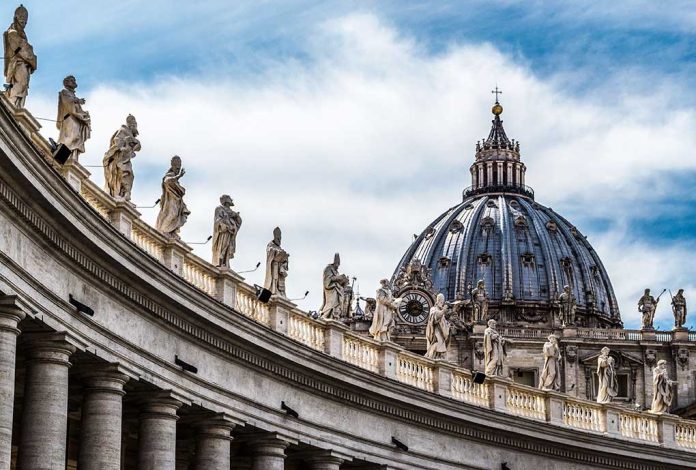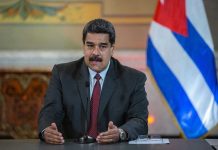
Secretary of State Marco Rubio has proposed the Vatican as neutral ground for Ukraine-Russia peace talks, offering a glimmer of hope in the devastating conflict that President Trump is determined to end.
Key Takeaways
- Secretary of State Marco Rubio has suggested the Vatican as a potential venue for Russia-Ukraine cease-fire talks, emphasizing the Holy See’s neutrality and diplomatic history
- Pope Leo XIV has pledged to contribute to ending the conflict, with the Vatican already playing a positive role in prisoner exchanges and humanitarian aid
- President Trump is planning direct communication with both Putin and Zelenskyy to accelerate peace negotiations
- Ukraine has agreed to an unconditional cease-fire, but Russia has made counter-offers, and Putin recently refused direct talks
- The conflict continues to escalate with a recent Russian strike killing 9 civilians in Ukraine’s Sumy region
Vatican Proposed as Neutral Diplomatic Ground
Secretary of State Marco Rubio has put forward the Vatican as a potential venue for hosting peace talks between Russia and Ukraine, highlighting the Holy See’s historical neutrality. During discussions with Cardinal Matteo Zuppi in Rome, Rubio emphasized that the Vatican would not function as a peace broker but rather provide a neutral setting for negotiations. The proposal comes as President Trump intensifies efforts to end what he describes as a “bloodbath” in Ukraine, with thousands of soldiers reportedly dying weekly.
“I think it’s a place that both sides would be comfortable going,” said Marco Rubio, Secretary of State.
The Vatican has already demonstrated its diplomatic utility by assisting with prisoner exchanges and providing humanitarian aid to Ukraine. Rubio expressed appreciation for these contributions, reinforcing the Holy See’s credibility as a potential facilitator. Vatican Secretary of State Cardinal Pietro Parolin has previously reiterated the Vatican’s willingness to host direct talks, stating its availability to both parties “with all the discretion needed.”
— Sentinel (@SentinelTeamHQ) May 5, 2025
Pope Leo XIV’s Commitment to Peace
Pope Leo XIV has been vocal about the Vatican’s readiness to help resolve the conflict, using both traditional diplomacy and social media to encourage negotiations between the warring nations. His commitment to facilitating dialogue represents an extension of the Vatican’s historical role in international diplomacy, particularly in conflicts where religious and cultural dimensions are present. The Pope has consistently called for a just and lasting peace in Ukraine since the conflict began.
“The Holy See is willing to help enemies meet, so they may look each other in the eye and so people may be given back the dignity they deserve: the dignity of peace. With heart in hand, I say to the leaders of nations: let us meet; let us dialogue; let us negotiate!” said Leo, Pope of the Catholic Church.
This papal initiative aligns with the Trump administration’s renewed push for peace as President Trump prepares to engage directly with Russian President Vladimir Putin and Ukrainian President Volodymyr Zelenskyy. The Pope’s appeal for leaders to “meet, dialogue, and negotiate” echoes the practical diplomatic approach that President Trump has championed since taking office, prioritizing direct communication over prolonged proxy conflicts.
Challenges in Peace Negotiations
Despite these diplomatic initiatives, significant obstacles remain. The Trump administration has struggled to engage Russia in cease-fire talks, with Ukraine agreeing to an unconditional cease-fire while Russia continues to make counter-offers. Putin recently declined to attend direct talks with Ukraine, signaling continued resistance to negotiation. Meanwhile, Russian Foreign Minister Sergei Lavrov has expressed appreciation for U.S. involvement, suggesting some openness to American mediation under the Trump administration.
The conflict continues to exact a deadly toll on Ukrainian civilians. President Zelenskyy has called for tougher sanctions on Russia following a Russian strike on a minibus that killed nine civilians in the Sumy region. While in Rome seeking support for a ceasefire, humanitarian aid, and rebuilding efforts, Zelenskyy’s diplomatic mission underscores the urgent humanitarian dimension of the conflict that the Vatican’s involvement might help address.
Trump’s Direct Diplomatic Approach
President Trump’s plan to personally contact both Putin and Zelenskyy represents a return to his signature direct diplomatic style that yielded results during his first term. This approach stands in stark contrast to the previous administration’s more distant handling of the conflict, which saw limited progress toward peace. Trump’s willingness to engage directly with both sides demonstrates his commitment to ending what has become a costly and destructive war, draining American resources and threatening broader European stability.
Russia’s lead negotiator, Vladimir Medinsky, has warned of a potentially prolonged conflict, referencing past long-term wars – a scenario President Trump has vowed to prevent through decisive action. With European leaders like Germany’s Friedrich Merz stating there is “no reason” for Europe to deploy troops to Ukraine, the diplomatic path championed by the Trump administration and potentially facilitated by the Vatican represents the most promising avenue toward ending the bloodshed.







